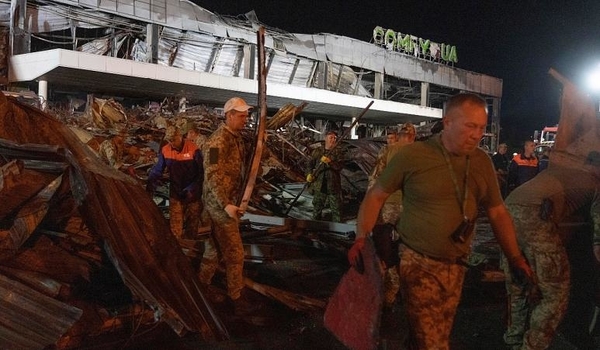Ukraine Shopping Centre Inferno: G7 leaders describe attack ‘abominable,’ says “Indiscriminate attacks on innocent civilians constitute war crime. Putin and those responsible will be held to account”
Firefighters and soldiers are searching for survivors in the rubble of a shopping centre in central Ukraine after Monday’s Russian missile strike killed at least 18 people and injured dozens.
At least 18 people were killed and 25 hospitalised, while about 36 were missing, said Dmytro Lunin, governor of the Poltava region, on Tuesday. The number of dead is two more than Monday’s overnight figure, and there are fears that more bodies may be found.
Early on Tuesday, family members of the missing lined up at a hotel across the street where rescue workers had set up a base after the strike on the shopping centre.
The attack has been strongly condemned by the United Nations and the West, with leaders labelling it a war crime.
Ukrainian President Volodymyr Zelenskyy has called Russia the world’s “largest terrorist organisation” in the wake of the deadly bombing in Kremenchuk.
More than 1,000 people were inside when two Russian missiles slammed into the building, the president said.
Also Read: Russian missiles hit shopping centre killing 10 and several others injured in central Ukraine
Leaders of the Group of Seven (G7) major democracies, at a summit in Germany, said the attack was “abominable”.
“Indiscriminate attacks on innocent civilians constitute a war crime. Russian President Putin and those responsible will be held to account,” they wrote in a joint statement tweeted by the German government spokesperson.
At Ukraine’s request, the United Nations Security Council scheduled an emergency meeting in New York to discuss the attack.
The UN called the strike “deplorable,” stressing that civilian infrastructure “should never ever be targeted,” spokesman Stephane Dujarric said.
Russian missiles hit a busy shopping centre in central Ukraine, killing 16 and injuring dozens
Ukraine war: Five things you need to know about the conflict from Monday
The missile strike unfolded as Western leaders pledged continued support for Ukraine, and the world’s major economies prepared new sanctions against Russia, including a price cap on oil and higher tariffs on goods.
Zelenskyy said the mall presented “no threat to the Russian army” and had “no strategic value.” He accused Russia of sabotaging “people’s attempts to live a normal life, which make the occupiers so angry.”
In his nightly address, he said it appeared Russian forces had intentionally targeted the shopping centre. “Today’s Russian strike at a shopping mall in Kremenchuk is one of the most daring terrorist attacks in European history,” he added.
Kremenchuk Mayor Vitaliy Maletskiy wrote on Facebook that the attack “hit a very crowded area, which is 100% certain not to have any links to the armed forces.”
In the first Russian government comment on the missile strike, UN representative Dmitry Polyanskiy alleged multiple inconsistencies that he didn’t specify, claiming on Twitter that the incident was a “provocation” by Ukraine. He later retweeted a post from another official Russian organisation appearing to hint the attack had been staged.
Russia has repeatedly denied it targets civilian infrastructure, even though Russian attacks have hit other shopping centres, theatres, hospitals, kindergartens and apartment buildings.
Images from the scene in the aftermath of the latest attack showed giant plumes of black smoke, dust and orange flames, with emergency crews rushing in to search broken metal and concrete for victims and put out fires.
Russia has increasingly used long-range bombers in the war. Ukrainian officials said Russian Tu-22M3 long-range bombers flying over Russia’s western Kursk region fired the missile that hit the shopping centre, as well as another that hit a sports arena in Kremenchuk.
The Russian strike echoed attacks earlier in the war that caused large numbers of civilian casualties — such as one in March on a Mariupol theatre where many civilians had holed up, killing an estimated 600, and another in April on a train station in eastern Kramatorsk that left at least 59 people dead.
LENS with Reuters, AP




